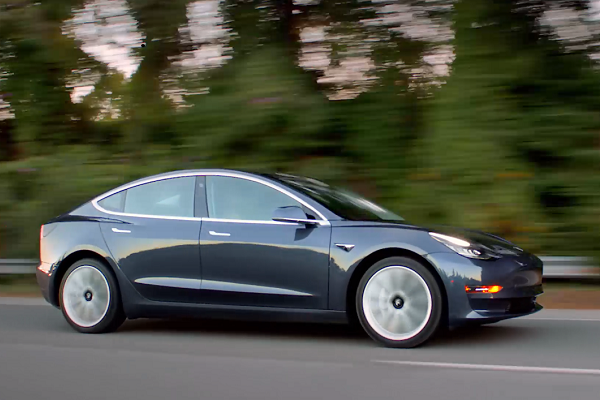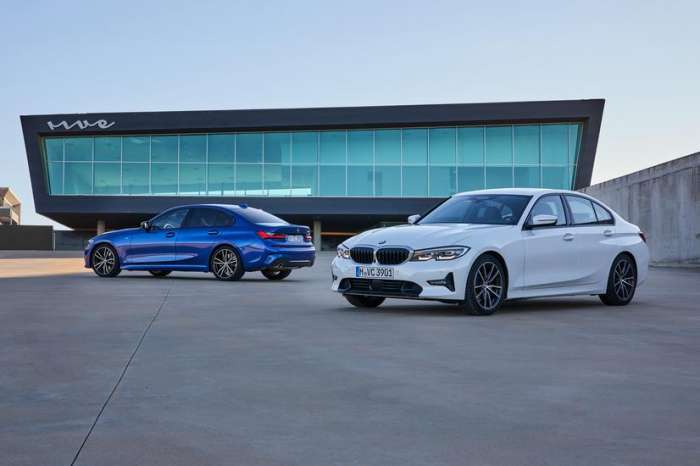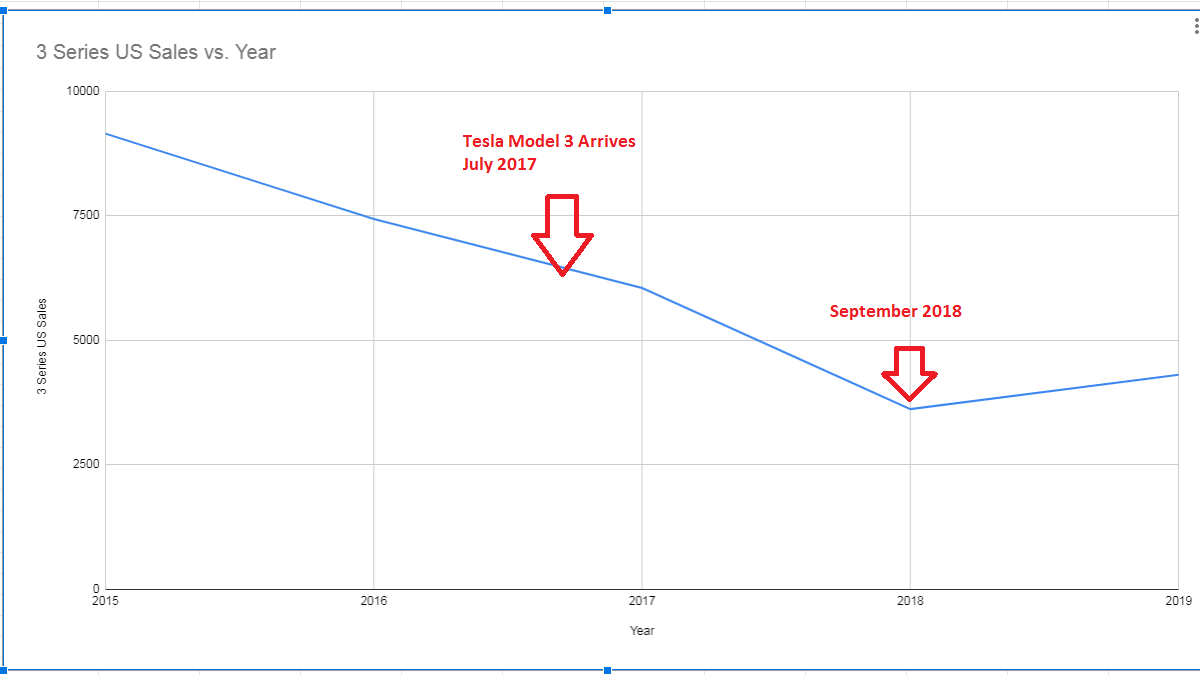The Tesla Model 3 has had a segment-changing effect on sales. One might assume that the incredibly-high sales that Tesla has posted with its Model 3 in America would be devastating to the brand and model that defined that segment prior to Tesla's Model 3 arrival. The impact is significant, but a look at some data reveals some interesting facts. Starting with the fact that BMW's sales are higher today than at the time of the Model 3's arrival.
 Related Story: Tesla Model 3 Outsells Every Car Model At BMW, Lexus - Outsells All of Audi and Acura (December 2018)
Related Story: Tesla Model 3 Outsells Every Car Model At BMW, Lexus - Outsells All of Audi and Acura (December 2018)
BMW 3 Series Sales History
The chart at the top of our page shows the change in monthly sales of the BMW 3 Series sedan line in America. Note that the X-axis (bottom) is time-stamped by September sales of each year indicted. In other words, the "2015" indicates the sales level of the 3 Series in September of 2015. The Y-axis ( the vertical axis) shows the number of BMW vehicles sold in September of the year indicated.
 BMW Sales Prior To Tesla Model 3
BMW Sales Prior To Tesla Model 3
As you can see, BMW's 3 Series sales were slowing prior to the arrival of the Tesla Model 3. In fact, they had dropped by a monthly rate of roughly nine thousand per month (in September) to roughly 6,000 per month (in September) from 2015 to 2017. The Model 3 arrived in July of 2017, but only in tiny numbers.
By September of 2018, one year ago, BMW's sales of the 3 Series sedan had declined by half again to 3,615 units. This was the peak period of Tesla's Model 3 sales in America. Interestingly, the BMW 3 Series sedan has increased in sales of September of this year. Rising up to 4,303 units of the 3 Series sedans sold in September, this past month.
Observations on BMW 3 Series Sedan Sales Might Include:
- BMW's 3 Series sedan sales were slowing rapidly before the Model 3 arrived in mid-2017.
- BMW's 3 Series sedans sales continued to slow as the Model 3 ramped up.
- BMW's 3 Series sales have stabilized and were up by 15% September 2019 vs. September 2018.
Tesla Impact On Markets
It is easy for one to assume that a new successful model entering into an established market segment will result in a one-for-one loss of sales by a major competitor. However, that is usually not the case, particularly in the automotive world. Rather, the new entrant dilutes the sales of the top seller by a major degree, but the existing model can sustain healthy sales despite the new model. Here, the 3 Series has retained decent sales. Particularly when one considers that the overall trend is a reduction in sedan sales.
BMW Overall Sales Trend
The really interesting part of the story is overall sales at BMW. One might assume since the 3 Series had defined the BMW brand at one time in the past, that any meaningful reduction in sales of the 3 Series would result in a lowering of sales at BMW. But that has not happened. In fact, BMW's year to date sales overall have grown over the years since 2015. BMW's sales to date in September of 2019 (27,467) are up 6% over sales to date in 2018 (25,908). They are also up from 2017 (25,571), 2016 (25,389), and 2015 (26,608). Please note again that these are not BMW year-end sales, but YTD September sales.
Tesla's Impact on BMW Sales - Conclusions
So, in conclusion, Tesla's Model 3 has resulted in a meaningful reduction in sales of the BMW 3 Series sedan. However, the 3 Series remains a top-seller in the segment (number two by our count), and its sales have stabilized. Perhaps more importantly, the BMW brand overall is healthy and it is hard to see any reduction in sales overall at BMW since the Model 3 arrived. In fact, the opposite is true. Since Tesla's Model 3 arrived in July of 2017, BMW's sales have increased meaningfully. Perhaps credit for that goes to BMW's product planners who were wise enough to see signs that crossovers were the future preference of shoppers in the premium/performance segment.
BMW's X3 is now the brand's top-selling model by a wide margin. We'd like to ask our readers what impact they think the new Model Y crossover from Tesla will have on BMW's sales when it arrives. Let us know in the comments below.
Note: MINI brand sales have been excluded from this analysis.
In addition to covering green vehicle topics, John Goreham covers safety, technology, and new vehicle news at Torque News. You can follow John on Twitter at @johngoreham.






Comments
I think that there is more at
Permalink
I think that there is more at play with the 3 Series sales than just Tesla's influence, even though it clearly had a strong impact. When Model 3 buyers were polled to see what cars that they had owned before, there certainly were quite a few BMWs, Mercedes, Audis and such, but the big surprise was that more Model 3 buyers came from owning a Honda Civic/Accord, Ford Focus/Fusion, Toyota Camry/Prius before they bought the Tesla. It seemed that after most buyers were replacing economy cars, many owners were predictably replacing performance and luxury cars. But the Tesla sales have been taking business from a wide spread of competitors. Which is one of the reasons why most every automaker will be offering hybrids/PHEVs and BEVs in their model lineup in the next 2-3 years.
As for the reason why BMW's 3 series slumped and rose back up, I think that the drop was affected by Tesla and a general new car sales decline, but it was also part of the normal automotive product cycle. BMW's Sixth generation (F30) 3 series had been mostly unchanged since it's 2011 debut, and sales predictably slowed over the years, especially as the market shifted from sedans to crossovers and SUVs. As for the rise in 3 Series sales, Oct 2nd was the unveiling of the Seventh generation (G20) 3 series, which was a sales success. The reviews of the previous 3 Series cars were not so rosy, but BMW listened to their buyers and revamped the newest model to have better road feel and subsequently better driver enjoyment. I think that the fact that many automakers have ditched their new sedan models left an open market for BMW to exploit, because they have long had a reputation in building superior performance/luxury sedans, and despite recent trends the 3 series sales shows that there is still a thriving market for those cars. Still, even though BMW happily kept and improved their sedans, they also followed the market in expanding their CUV/SUV models, with similar improvements across their line up. I do however believe that they do need to brace for the impact of the Model Y's introduction, which should hit the world auto market as hard as the Model 3's introduction did in the U.S., with record breaking sales next year. Of course the EV market is poised to gain momentum in a big way over the next two years, and EV competition will only get stiffer as the bigger automakers release their own EVs. I think that (like before), the gas companies will hike up gas prices approaching $5 per gallon, and that there will be a backlash against the recent truck/SUV trends, and there will then be a swing back towards new Hybrids, EVs and PHEVS.
Great insight on the 3 Series
Permalink
In reply to I think that there is more at by DeanMcManis (not verified)
Great insight on the 3 Series generational change Dean. Thanks for adding that in. I'm testing one today and trying (hard) to come up with some positives angles on what the car offers for $58K. Some days the job is harder than others :)
Interesting take but disagree
Permalink
Interesting take but disagree that gasoline companies want to hike prices to $5 a gallon and kill their demand. California gas prices have blown out due to aggressive new taxes, a ‘cap and trade’ sin tax, costly refinery formulation mandates by CARB, terminal tankage constraints limiting fuel imports creating an ‘island market’ with price spikes at the slightest supply upset. CA politicians want to kill gas demand, not fuel suppliers, and these Dems don’t care if it drains your wallet. Their attitude-‘Just buy a Tesla’. That’s why CA gas prices are almost double the rest of US.